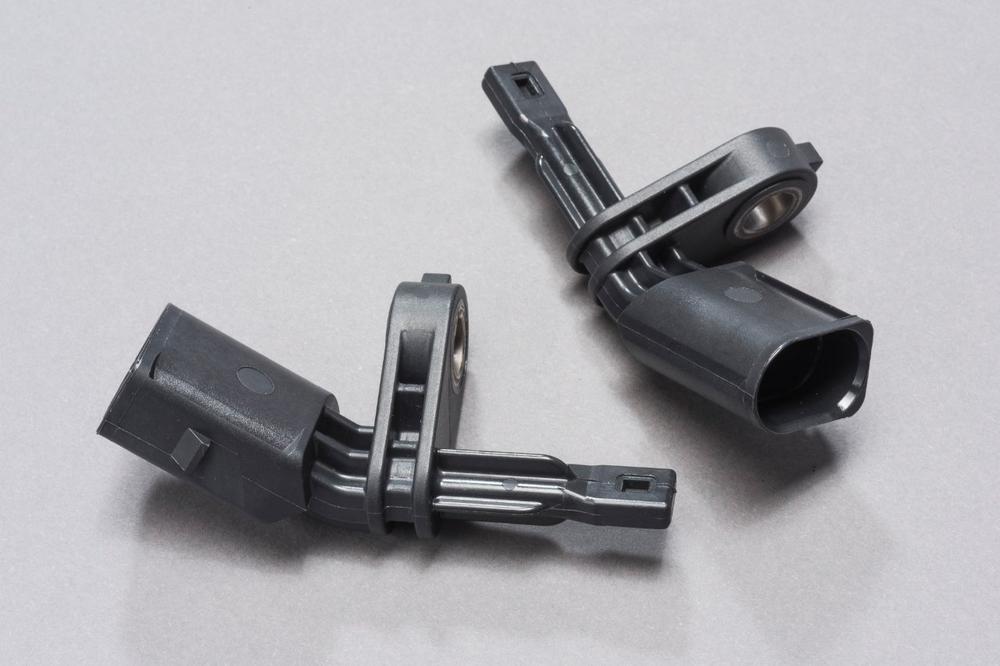- PBT impresses with a unique combination of different properties such as outstanding hydrolysis resistance and good flowability
- Safety for sensitive electronics in extremely challenging environments
In automotive electrics, many small components are of great importance. Delicate wheel speed sensors, for example, play a crucial role in the safe functioning of a vehicle. They detect the wheels’ number of revolutions and pass on the information to the ABS and ESP. This is critical in driving situations such as an emergency break as it enables the systems to take preemptive actions to maintain vehicle stability and steering ability. Because they are positioned next to the wheels, the sensors are exposed to extreme climatic conditions and media such as splash water and salt.
With the polybutylene terephthalate (PBT) Ultradur® B4335G3 HR HSP, BASF has developed a material that protects sensitive electronics from such influences. The unique combination of various properties sets Ultradur® apart from alternative materials.
Increase in safety standard
The PBT is equipped with highly effective additives that greatly delay hydrolytic degradation. This makes the material resistant to damage by water at elevated temperatures. At the same time, the standard low moisture absorption of 0.2% is retained, which gives the PBT excellent electrical insulation properties and good dimensional stability. It is also resistant to stress cracking caused by alkaline media. Making the component more durable and reliable, which increases the safety standard.
The grade also benefits from being a high-speed product (HSP). This reduces the melt viscosity, which enables the production of thin-walled components.
Suitable for the most demanding conditions
"Ultradur® B4335G3 HR HSP combines a number of strong properties into a unique profile. This makes it ideal for the use in extremely challenging environments which sets Ultradur® apart from comparable materials that are currently used", said Andreas Fay, Global Key Account Manager Transportation in BASF’s Performance Materials division.
The new product grade represents a significant expansion of the Ultradur® HR portfolio, with which BASF is successfully meeting the increasing demands placed on plastics in critical applications.
About BASF’s Performance Materials division
BASF’s Performance Materials division encompasses the entire materials’ know-how of BASF regarding innovative, customized plastics under one roof. Globally active in four major industry sectors – transportation, construction, industrial applications, and consumer goods – the division has a strong portfolio of products and services combined with deep understanding of application-oriented system solutions. Key drivers of profitability and growth are our close collaboration with customers and a clear focus on solutions. Strong capabilities in R&D provide the basis to develop innovative products and applications. In 2019, the Performance Materials division achieved global sales of €6.06 bn. More information online: www.plastics.basf.com.
At BASF, we create chemistry for a sustainable future. We combine economic success with environmental protection and social responsibility. More than 117,000 employees in the BASF Group work on contributing to the success of our customers in nearly all sectors and almost every country in the world. Our portfolio is organized into six segments: Chemicals, Materials, Industrial Solutions, Surface Technologies, Nutrition & Care and Agricultural Solutions. BASF generated sales of €59 billion in 2019. BASF shares are traded on the stock exchange in Frankfurt (BAS) and as American Depositary Receipts (BASFY) in the U.S. Further information at www.basf.com.
BASF SE
Carl-Bosch-Straße 38
67056 Ludwigshafen
Telefon: +49 (621) 60-0
Telefax: +49 (621) 60-42525
http://www.basf-ag.de
Communications Performance Materials – Transportation
Telefon: +49 (621) 60-42223
E-Mail: max.kron@basf.com
![]()

